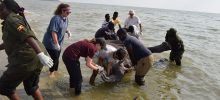The Black Fly Insect Larvae Enterprise for COVID-19 Livelihood Resilience Project Launched at CoVAB
The College of Veterinary Medicine, Animal Resources and Biosecurity (CoVAB) in Collaboration with Michigan State University has embarked on upscaling the use of the Black Fly Larvae as a source of insect protein for animal production.
An awareness session was convened at the college on Monday 20th February 2023, attended by stakeholders that included the academia, entomology extension staff from peri urban districts, officials from the Ministry of Agriculture, Animal Industry and Fisheries (MAAIF) and the Centre for Insect Research and Development (CIRD).

L-R Commissioner Entomology, Dr. Amulen Deborah, Prof. Eric Benbow, Prof. Acai Okwee and Dr. Vudriko Patrick interact at the launch event
The Black fly larvae is known to be one of the most environmentally friendly sources of insect protein that is highly nutritious and cheap to rear making it a possible replacement of expensive animal protein based feed ingredients like mukene or silver fish.
During the project launch, it was explained that Black Soldier Fly Larvae farming was growing rapidly despite some challenges that include issues of safety and quality of the larvae produced from different farms, the nutritional content as well as the mixing ratios with other feed ingredients.
Dr. Amulen Deborah and Dr. Patrick Vudriko the respective Principal and Co -Investigators are working together with Prof. Eric Benbow and Dr. Jennifer Pechal from Michigan State University in implementing the USAID funded project namely; Scaling cost effective, safe and quality Black Soldier fly insect larvae enterprise for COVID-19 Livelihood resilience in Uganda. The project comes in to address some of the identified challenges in the Black Soldier Fly enterprise.
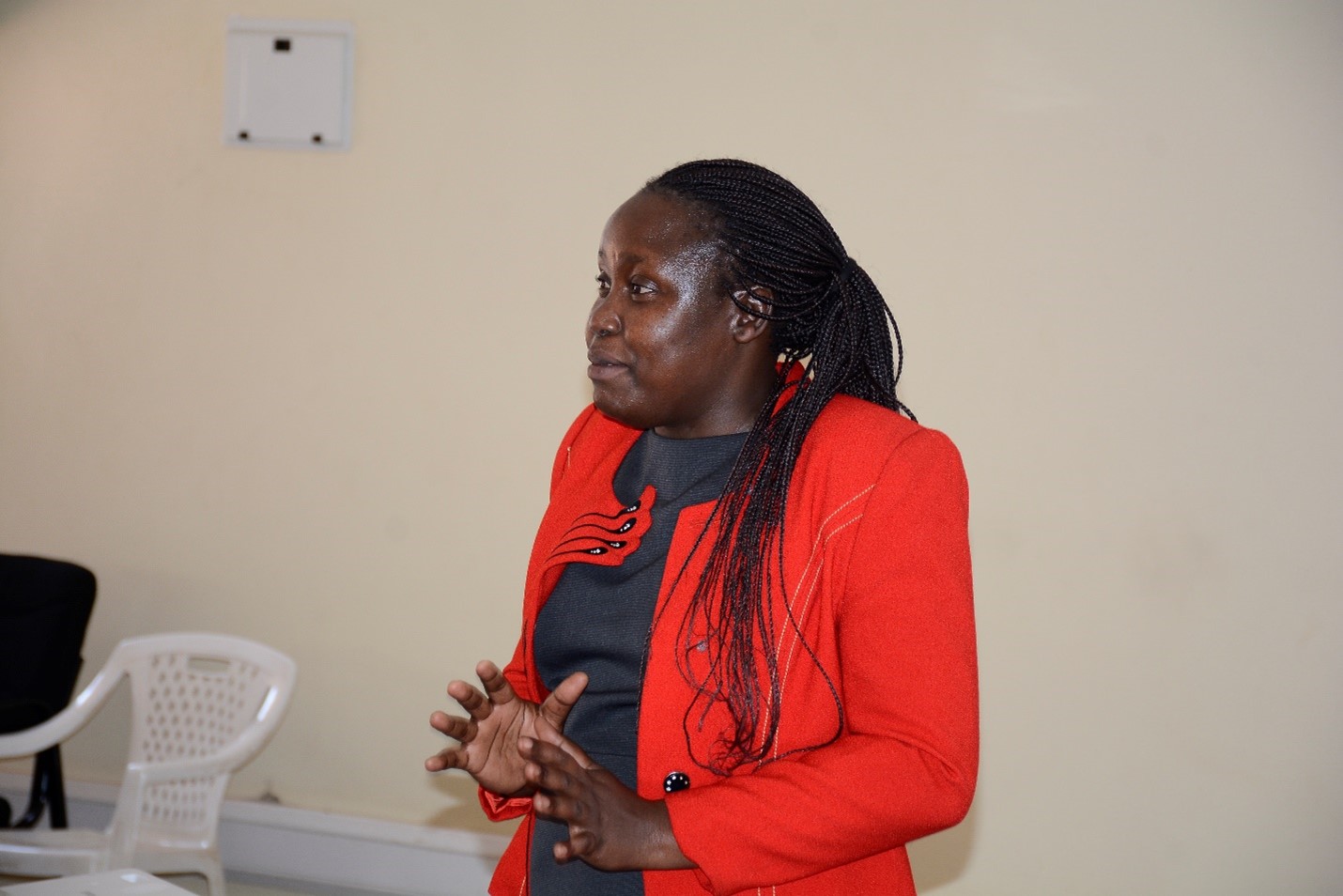
Principal Investigator, Dr. Amulen Deborah addresses the participants
According to Dr. Amulen Deborah, the key outputs of the project include a Policy brief on the use of Black Soldier fly larvae in livestock value chains which will guide the policy formulation processes by the planners. She said the one-year project that is supporting a Masters’ Student on Veterinary Medicine will also come out with one formula for BSFL based diet for broiler chicken.
Dr. Amulen explained that in line with the Universities community outreach policy, the project will support training of 100 youth and women in BSFL startups and for sustainability purposes support the Centre for Insect Research and Development (CIRD) as a one stop knowledge center. In addition to strengthening the collaboration between Makerere and Michigan State University, Dr. Amulen explained that another output will be a scientific research paper within the scope of the objectives of the project.
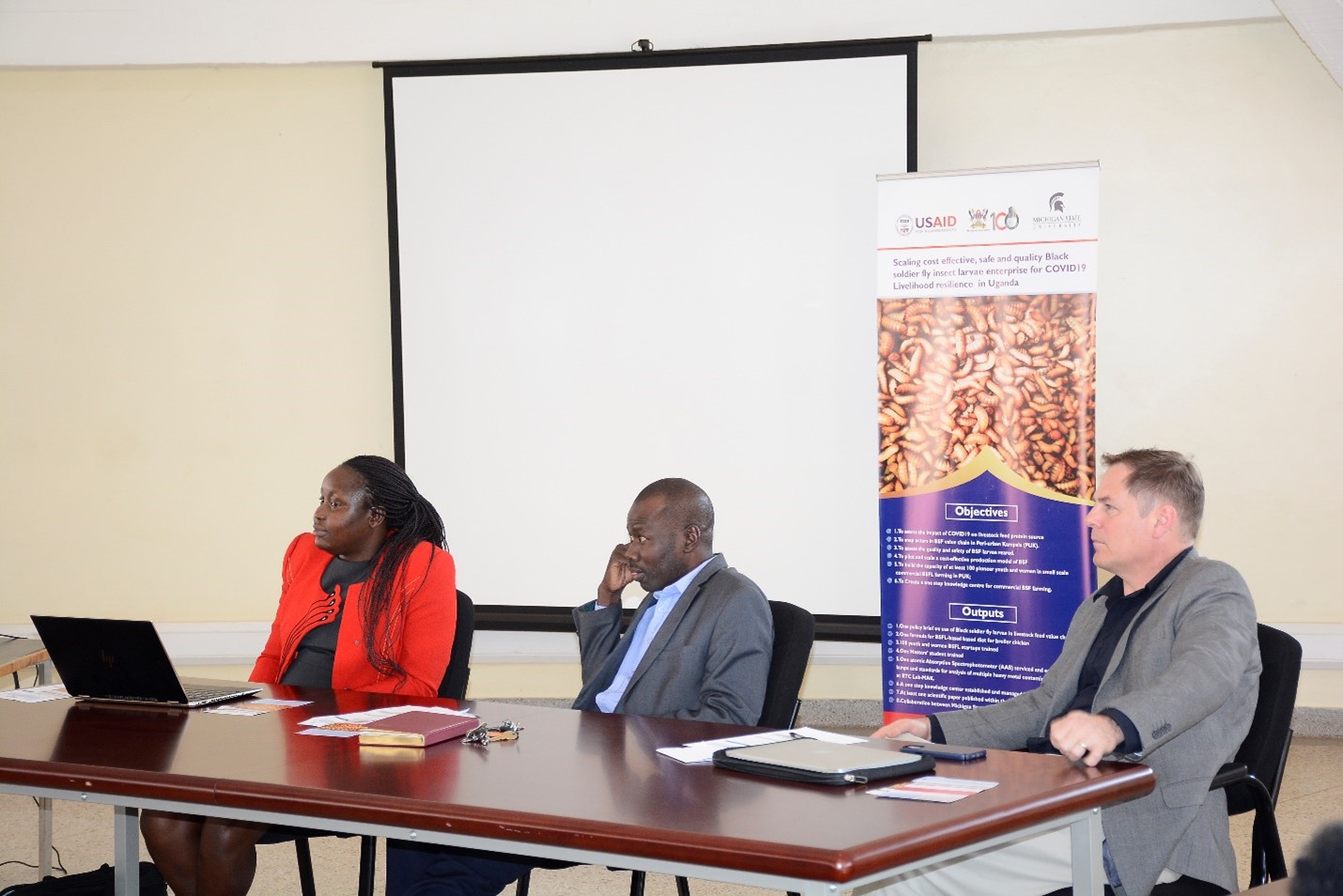
PI, Dr. Amulen Deborah, Deputy Principal Covab Prof. Acai and Prof. Eric Benbow
The project is intended to assess the impact of COVID-19 on livestock feed protein source to map out actors in the BSFL value chains in Peri Urban Kampala and to assess the quality and safety of BSF larvae reared. It is also intended to build the capacity of women and youth in small scale commercial BSFL farming in the Districts of Mpigi, Wakiso, Mukono Entebbe and Luweero.

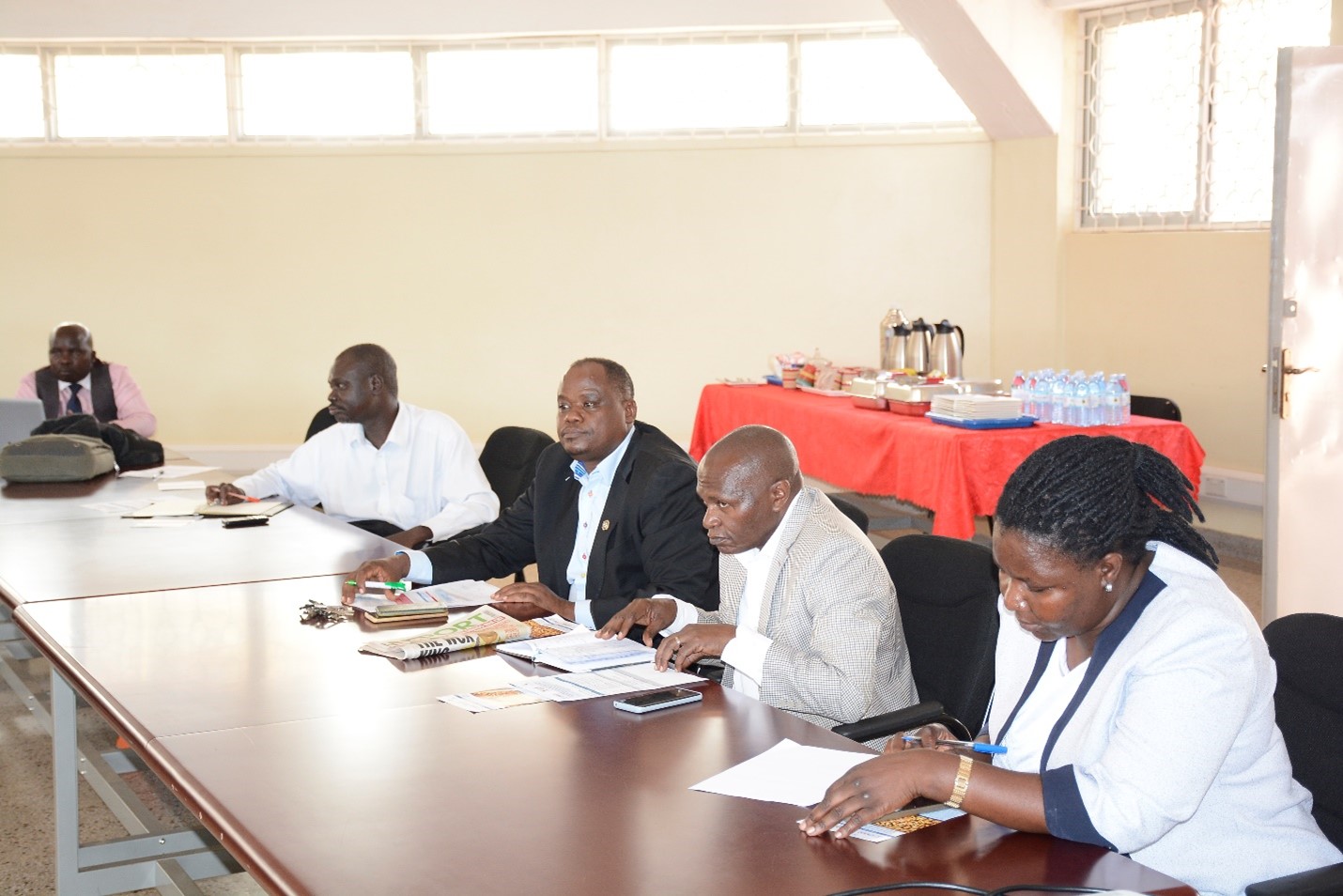
Participants listen attentively to the proceedings
The collaborating Institutions include Makerere University, Michigan State University and the Centre for Insect research and Development (CIRD), which has since 2019 piloted small-scale commercial BSFL farming under the leadership of the Principal Investigator on this project, Dr. Amulen. The major milestones achieved by CIRD in the pilot phase include setting up a small-scale BSFL unit producing one ton of BSFL weekly, supporting establishment of 100 BSF farming business, establishing market channels for both BSF equipment and breeding seeds such as eggs and pupae, as well as creating demand for dry BSFL among poultry and animal farmers.
In the course of implementing the project, entomologists from selected Districts will support the identification of farmers willing to start BSF farming and serve as focal point persons in the baseline study. The other planned activities include three field questionnaire surveys, seven training workshops for commercial BSL farming to be conducted at CIRD, Laboratory analysis of BSFL for nutritional content and safety, feeding experimentation and determining the performance of black soldier Fly larvae based feed in broiler chicken as well as a dissemination workshop.
Dr. Vudriko Patrick the Co- PI while giving his reflections on the BSFL enterprise pointed out the need to seriously consider sustainability and the economics of the enterprise, the alternative wastes and their supply chain management as well as the legal framework for the enterprise, in addition to the National technical capacity for BSF development at Ministry and Local Government levels as institutions mandated to undertake training.
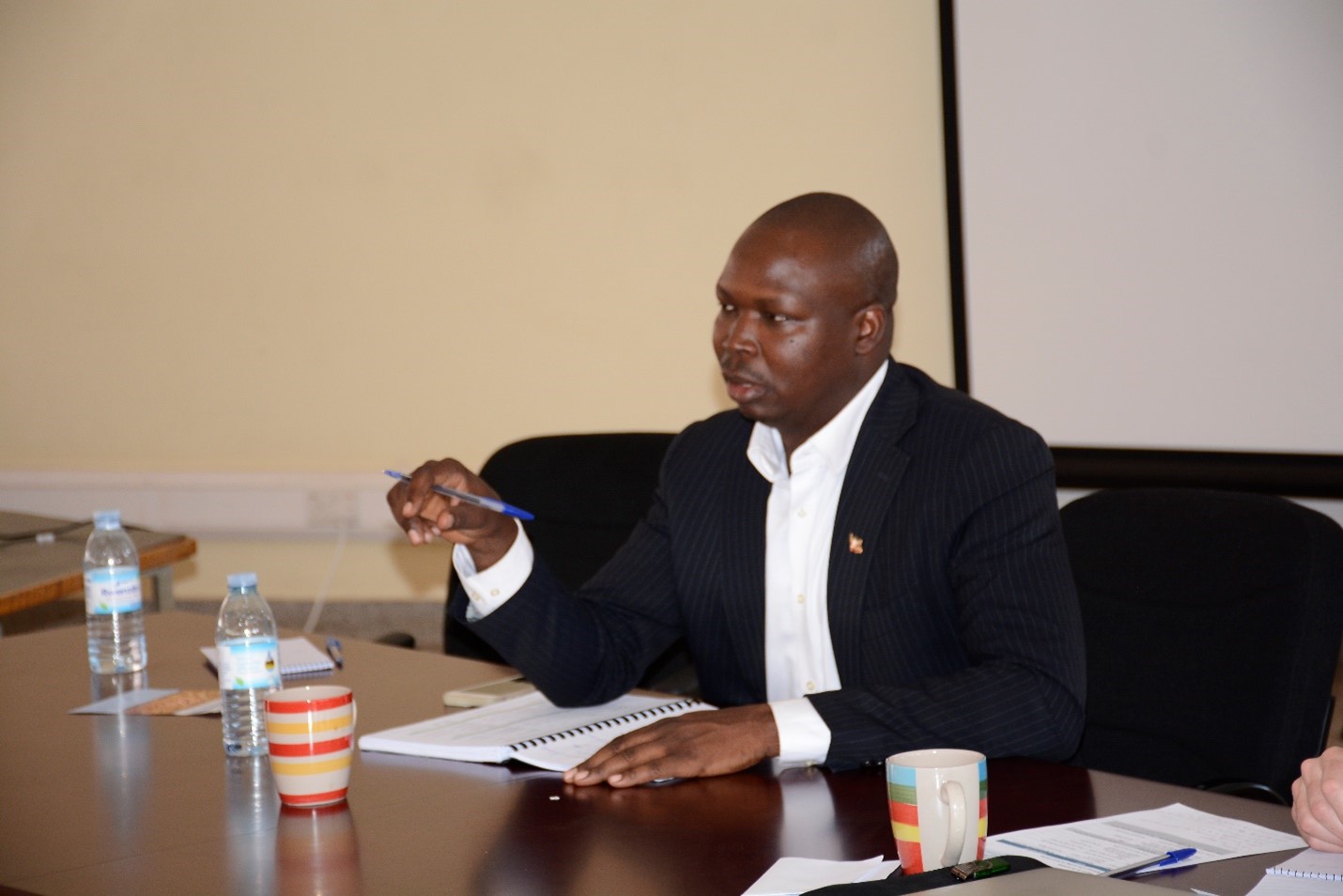
Co-PI, Dr. Patrick Vudriko makes his submission
Dr. Vudricko emphasized the need for education as a vehicle for knowledge expansion and human resource technical competence, noting that our education system lacks the technical competence, citing the limited content for BSFL training at the College of Veterinary Medicine, Animal Resources and Biosecurity (CoVAB), The College of Natural Sciences (CONAS) and the College of Agricultural and Environmental Sciences (CAES).
He further emphasized the need for a product diversification as part of a holistic value chain development, product diversification, zero waste, not only looking at the larvae but considering maximizing revenue from all products. Other areas to focus he proposed, concerned product certification, determining who to call a breeder, and what it takes for one to qualifies to become one.
The Ministry of Agriculture, Animal Industry and Fisheries was in attendance to address issues concerning establishing whether the relevant, laws and regulations were in place, as a condition for providing an enabling environment and ensuring the right standards in order to have the desired quality of products. MAAIF was also to give guidance regarding the existing technical capacity of the ministry and offer direction.
While officiating at the closing of the engagement, the Commissioner for Entomology in the Ministry of Agriculture Animal Resources and Fisheries Mr. Lawrence Tusiime Muhangi noted that the Black Soldier Fly was relatively a new venture. ‘Apart from using the basic principles of entomology, we are all here to learn and the National Livestock Development Policy is the starting point for us all. Most of our participation is in bee keeping and my wish would be to advocate for skilling students at university’, said the Commissioner, affirming that the standards were not in place. He said the Ministry was aligning the Animal Disease Management Bill and that given the fact that the Black Soldier Fly was a biological organism, there was need for a training manual and standards to create a fair condition for all stakeholders, including development economists, the academic, the farmers and extension workers to participate.

Commissioner Entomology MAAIF ® addresses the participants
He commended CoVAB for initiating the project and emphasized the need for the Ministry to considered other areas of entomology including the Black Soldier fly since it was steadily getting onboard as a viable enterprise. ‘We need to check where we are in different areas of entomology. Communities are looking at entomologists to get solutions to the many challenges they face and the ministry needs to come in and support’, he said.
He encouraged Makerere University through the key departments responsible for basic entomology to carry out a campaign to ensure that the needed infrastructure is put in place, cognizant of the fact that there were few staff entomologists at the ministry. ‘Use friends, colleagues and contemporaries to push this agenda forward. I look at this as a salvation. These things are known in a small way but we need to think beyond what the entomologist can say’ he said while emphasizing the need for the academia to support to the Ministry on instituting the necessary polices and guidelines.
The commissioner encouraged the entomologists to ensure that there were demonstrations at the Districts and where they were not, have them started at their respective homes, and that with more orientation, more knowledge was to be gained in the management of the Black Soldier Fly enterprises.
In this project, the BSF value chain actors will be coordinated by the private sector (the Center for Insect Research and Development, CIRD) and regulated by the Department of Entomology, Ministry of Agriculture, Animal industry, and Fisheries.
Story by Musinguzi Harriet






